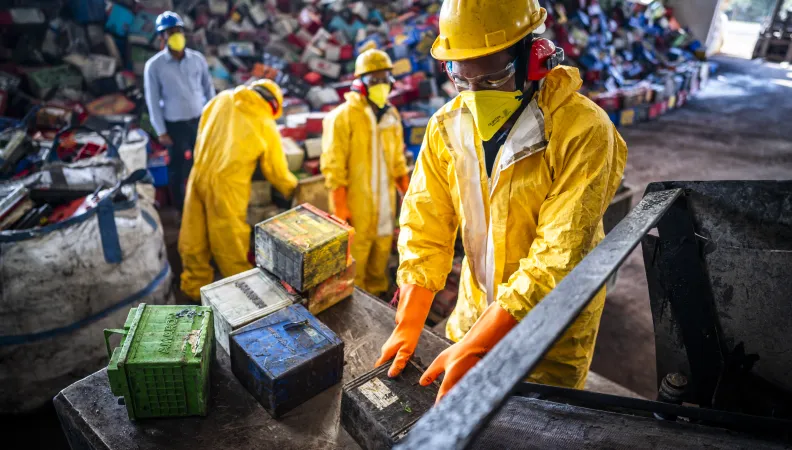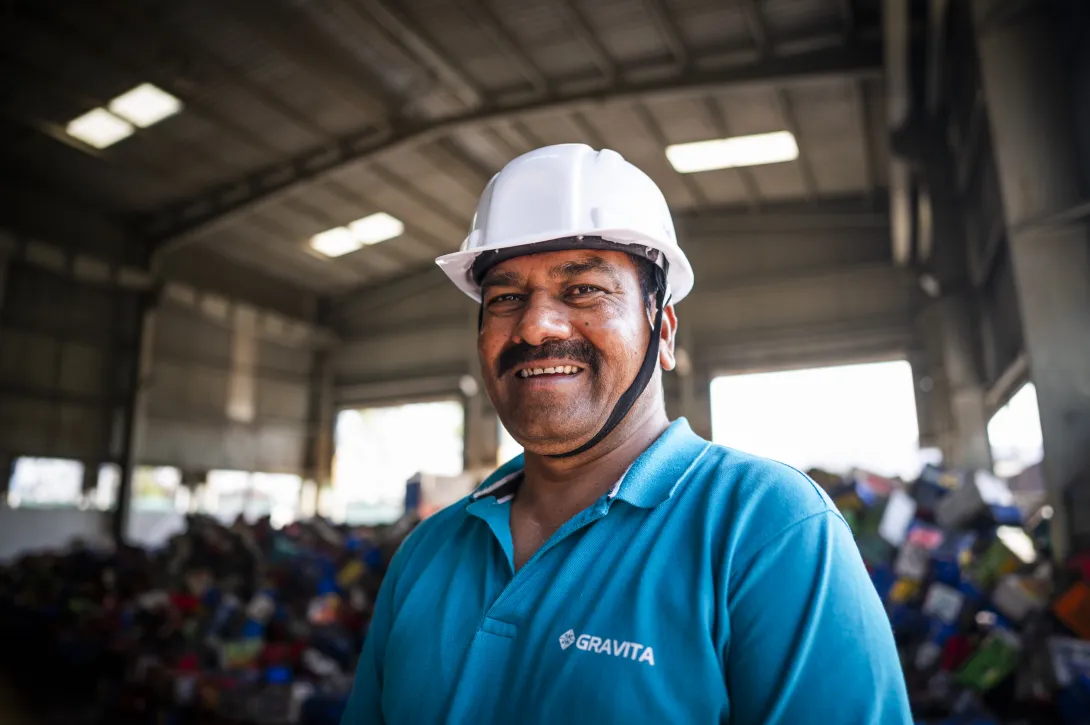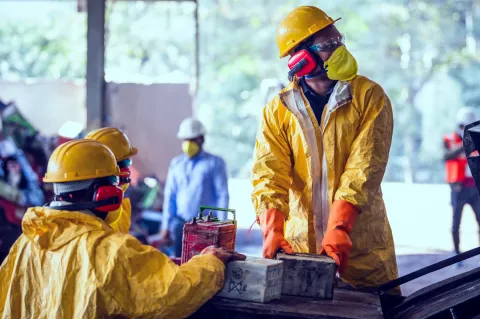Share the page
Gravita: eco-responsible lead battery recycler in India
Published on

Founded in 1992, the Indian group Gravita handles some 240,000 tonnes of lead-acid batteries every year, in compliance with strict environmental and safety standards. This leading industrial player has recently been financed by Proparco. The Group is also present in Sri Lanka and five African countries and is helping to structure a sector that is often dominated by informal players in developing countries. This report is from the Group's headquarters in Jaipur, capital of the Indian state of Rajasthan.

Discipline and strict management. At Gravita's industrial site, covering several hectares in the Phagi district, some thirty kilometres from the Indian city of Jaipur, everything is meticulously managed based around order and method. Meals - taken at set times in dedicated areas; rest periods - granted to the site's 400 employees; and safety instructions - posted at the entrance to all the buildings - are all strictly adhered to.
Dealing with illegal players in the informal sector
"This is a sensitive industrial site that recycles large quantities of lead from used batteries, most of which are used by the automotive industry. Compliance with safety regulations is absolutely crucial for us", says Sunil Kumar, General Manager of the plant. As this materials chemical engineer points out, this safety priority "is unfortunately not always respected by all players [in a market reputed to be a free-for-all]". In India - just like in Pakistan, Bangladesh and many African countries - there is a plethora of small, illegal lead battery dismantling plants, most of which do not take appropriate precautions. In these regions, unofficial recycling (also known as “backyard" recycling) dominates the local market.
The Indian website "The Third Pole" (cited in Courrier International) reminds us of this reality: “Surging demand for recycling has led to the emergence of a vast and flourishing informal sector in South Asia [...] However, once dismantled, these illegal factories often leave behind "acid-contaminated soil, old battery cases and random holes dug in the ground.”
This was borne out by Naveen Prakash Sharma, Group CEO, speaking from Gravita’s HQ in Jaipur: "The informal lead-acid battery recycling industry - whose players have no regard for any rules - has a major impact on the environment and on the Indian economy as well as on those of other developing countries. We need to regulate the market more effectively and prohibit the informal sector."
Proparco and OeBB have teamed up to boost Gravita's capacity
In 2023, Proparco and OeEB (the Austrian development finance institution) provided joint financing of €34 million to Gravita Netherlands B.V., the international division of Gravita India Limited. This operation is designed to support the development of the Group's new recycling facilities - particularly in Ghana and Senegal - in order to provide additional capacity and launch new markets (especially in copper and rubber recycling). The funding will also meet the working capital requirements of Gravita's international division and help this industry player to enhance its E&S strategy through an Environmental and Social Action Plan (ESAP). As Gravita's Executive Director explains, "Proparco has not only provided us with financial support, it has also given us a new vision in terms of sustainability and growth, as well as environmental, social and governance (ESG) challenges.”
Risk reduction
At the Phagi site, where Gravita recycles almost 25,000 tonnes of batteries every year (around 10% of the Group's total capacity) as well as aluminium waste, everything is under control. The staff wear special safety equipment (gloves, masks and overalls), while each industrial building (there are around ten on-site) handles a specific stage in the recycling process: hydraulic fracturing, smelting, refining, recovery of "red lead", etc. "This division allows us to compartmentalise the process and isolate the risks," explains Sunil Kumar.

This complex recycling process involves many tricky operations, such as refining lead parts or purifying the electrolyte (battery acid) drained from the battery. As the World Health Organisation points out in a dedicated study, lead can be released at any time and melting of components can generate dangerous fumes.
Gravita Group's priorities are guaranteeing a safe recycling process and controlling its impact on the environment. As thePhagi site manager stresses, "It's a highly demanding process. There is no margin for error.” Next to the furnaces, where used lead is melted before being recycled in the form of 10 to 15 kilo bars, a complete industrial process - known as the Air Conditioner Security System - captures and sequesters all the toxic fumes produced by combustion. "Nothing is released into the atmosphere or into the ground", he categorically states.
Quality is also paramount for the industrial producer: in a dedicated laboratory at the heart of the Phagi site, scientific teams take readings several times a day to measure the purity of the recycled lead (which must be over 99.9% pure).
From India to the rest of the world: Gravita is broadening its horizons
As a global player, in recent years the Group has diversified into new sectors (aluminium, plastics, rubber) and new geographies, and is pursuing an ambitious strategy aimed at developing new recycling units on an international scale. Its Executive Director explains that as "a key player in India and Africa, the Gravita Group is keen to expand its horizons to the Central and South American markets. Thanks to Proparco's support, we will also be able to achieve carbon neutrality at all of our current and future production facilities.”

Recycling in the name of art
To prove that everything can be transformed, the Gravita group has had works of art created from its industrial waste. The artist Nidhi, from Rajasthan, has taken over the Phagi site (as well as the group's other factory in Jaipur) to create a dozen magnificent sculptures out of recycled metal. At the factory entrance, two works representing a family (two parents and two children) symbolise the social ties that unite all site employees. Several representations of animals - including an owl (symbol of prosperity in India) and an elephant (the symbol of Rajasthan), see below - have been installed near rest areas and at the entrance to production units. The artist wanted to connect employees with natural elements and "bring nature into the factory". Nidhi is also working at another of the Group's factories in southern India.
Key figures
- 12 factories
- 1,500 collection points
- 240,000 tonnes of batteries recycled every year
